完型、阅读
完形填空 阅读理解中考经典题型带答案
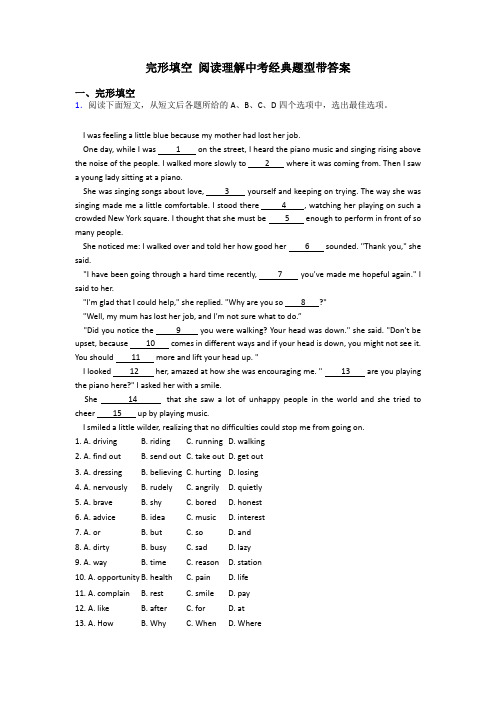
完形填空阅读理解中考经典题型带答案一、完形填空1.阅读下面短文,从短文后各题所给的A、B、C、D四个选项中,选出最佳选项。
I was feeling a little blue because my mother had lost her job.One day, while I was 1 on the street, I heard the piano music and singing rising above the noise of the people. I walked more slowly to 2 where it was coming from. Then I saw a young lady sitting at a piano.She was singing songs about love, 3 yourself and keeping on trying. The way she was singing made me a little comfortable. I stood there 4 , watching her playing on such a crowded New York square. I thought that she must be 5 enough to perform in front of so many people.She noticed me: I walked over and told her how good her 6 sounded. "Thank you," she said."I have been going through a hard time recently, 7 you've made me hopeful again." I said to her."I'm glad that I could help," she replied. "Why are you so 8 ?""Well, my mum h as lost her job, and I'm not sure what to do.”"Did you notice the 9 you were walking? Your head was down." she said. "Don't be upset, because 10 comes in different ways and if your head is down, you might not see it. You should 11 more and lift your head up. "I looked 12 her, amazed at how she was encouraging me. " 13 are you playing the piano here?" I asked her with a smile.She 14 that she saw a lot of unhappy people in the world and she tried to cheer 15 up by playing music.I smiled a little wilder, realizing that no difficulties could stop me from going on.1. A. driving B. riding C. running D. walking2. A. find out B. send out C. take out D. get out3. A. dressing B. believing C. hurting D. losing4. A. nervously B. rudely C. angrily D. quietly5. A. brave B. shy C. bored D. honest6. A. advice B. idea C. music D. interest7. A. or B. but C. so D. and8. A. dirty B. busy C. sad D. lazy9. A. way B. time C. reason D. station10. A. opportunity B. health C. pain D. life11. A. complain B. rest C. smile D. pay12. A. like B. after C. for D. at13. A. How B. Why C. When D. Where14. A. dreamed B. hoped C. guessed D. explained15. A. us B. them C. me D. her【答案】(1)D;(2)A;(3)B;(4)D;(5)A;(6)C;(7)B;(8)C;(9)A;(10)A;(11)C;(12)D;(13)B;(14)D;(15)B;【解析】【分析】这篇短文中作者主要记述了当母亲失业,自己在心情低落时,遇到的一位街头歌手。
初二完型阅读
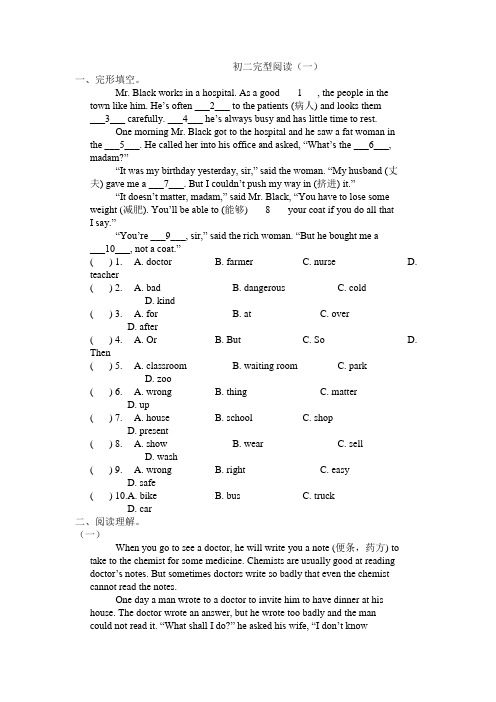
初二完型阅读(一)一、完形填空。
Mr. Black works in a hospital. As a good ___1___, the people in the town like him. He’s often ___2___ to the patients (病人) and looks them___3___ carefully. ___4___ he’s always busy and has little time to rest.One morning Mr. Black got to the hospital and he saw a fat woman in the ___5___. He called her into his office and asked, “What’s the ___6___,madam?”“It was my birthday yesterday, sir,” said the woman. “My husband (丈夫) gave me a ___7___. But I couldn’t push my way in (挤进) it.”“It doesn’t matter, madam,” said Mr. Black, “You have to lose some weight (减肥). You’ll be able to (能够) ___8___ your coat if you do all thatI say.”“You’re ___9___, sir,” said the rich woman. “But he bought me a ___10___, not a coat.”( ) 1. A. doctor B. farmer C. nurse D.teacher( ) 2. A. bad B. dangerous C. coldD. kind( ) 3. A. for B. at C. overD. after( ) 4. A. Or B. But C. So D.Then( ) 5. A. classroom B. waiting room C. parkD. zoo( ) 6. A. wrong B. thing C. matterD. up( ) 7. A. house B. school C. shopD. present( ) 8. A. show B. wear C. sellD. wash( ) 9. A. wrong B. right C. easyD. safe( ) 10.A. bike B. bus C. truckD. car二、阅读理解。
七年级英语上册完型和阅读训练

七年级英语上册完型和阅读训练Unit 1 Friendship。
Part I: 完型填空。
阅读下面的短文,从短文后各题所给的四个选项(A、B、C和D)中,选出可以填入空白处的最佳选项。
My best friend's name is Lily. We have been friends for many years. We first met in1st grade and have been inseparable ever since. Lily is a very 1 girl. She is always therefor me when I need her and she always knows how to make me feel better.Lily and I have a lot in common. We both enjoy 2 books and watching movies.Every weekend, we go to the library together and borrow books to read. We also enjoy 3 movies at the cinema. We laugh and cry together while watching our favorite movies.Lily is also a very 4 person. She is always willing to help others. One time, when I was sick and couldn't go to school, she 5 all my homework for me and brought it to my house. She didn't want me to fall behind in my studies. I am really grateful to have a friend like her.Lily and I have had some 6 together as well. We have had arguments and disagreements, but we always find a way to 7 our differences and make up. We believe that a true friendship is about understanding and forgiveness.In conclusion, I am very lucky to have Lily as my best friend. She is caring, kind,and always there for me. We share many interests and have a lot of fun together. I believe that our friendship will last a lifetime.Part II: 阅读理解。
九年级英语阅读完型周练含答案
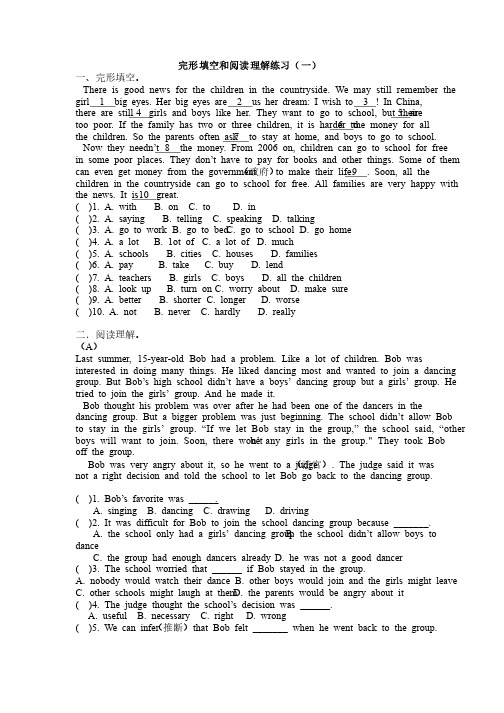
完形填空和阅读理解练习(一) 一、完形填空。
一、完形填空。
There is good news for the children in the countryside. We may still remember the girl 1 1 b ig big big eyes. eyes. eyes. Her Her Her big big big eyes eyes eyes are are 2 2 u s us us her her her dream: dream: dream: I I I wish wish wish to to 3 3 ! ! In In In China, China, there are still 4 girls and boys like her. They want to go to school, but their 5 are too poor. If the family has two or three children, it is harder to 6 t he money for all the money for all the children. So the parents often ask 7 t o stay at home, and boys to go to school. to stay at home, and boys to go to school. Now they needn’t 8 8 t he money. From 2006 on, children can go to school for free the money. From 2006 on, children can go to school for free in some poor places. They don’t have to pay for books and other things. Some of them can even get money from the government (政府)to make their life 9 . Soon, all the . Soon, all the children in the countryside can go to school for free. All families are very happy with the news. It is 10 great. ( )1. A. with )1. A. with B. on C. to D. in ( )2. A. saying )2. A. saying B. telling C. speaking D. talking ( )3. A. go to work )3. A. go to work B. go to bed C. go to school D. go home ( )4. A. a lot )4. A. a lot B. 1ot of C. a lot of D. much ( )5. A. schools )5. A. schools B. cities C. houses D. families ( )6. A. pay )6. A. pay B. take C. buy D. lend ( )7. A. teachers )7. A. teachers B. girls C. boys D. all the children ( )8. A. look up )8. A. look up B. turn on C. worry about D. make sure ( )9. A. better )9. A. better B. shorter C. longer D. worse D. worse ( )10. A. not )10. A. not B. never C. hardly D. really 二.阅读理解。
七年级英语完型阅读30篇
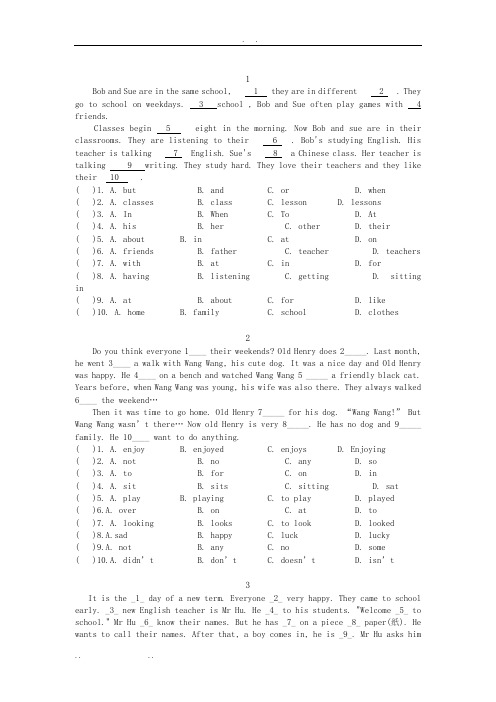
1Bob and Sue are in the same school, 1 they are in different 2 . Theygo to school on weekdays. 3 school , Bob and Sue often play games with 4 friends.Classes begin 5 eight in the morning. Now Bob and sue are in their classrooms. They are listening to their 6 . Bob's studying English. His teacher is talking 7 English. Sue's 8 a Chinese class. Her teacher is talking 9 writing. They study hard. They love their teachers and they like their 10 .( )l. A. but B. and C. or D. when( )2. A. classes B. class C. lesson D. lessons( )3. A. In B. When C. To D. At( )4. A. his B. her C. other D. their( )5. A. about B. in C. at D. on( )6. A. friends B. father C. teacher D. teachers ( )7. A. with B. at C. in D. for( )8. A. having B. listening C. getting D. sittingin( )9. A. at B. about C. for D. like( )10. A. home B. family C. school D. clothes2Do you think everyone 1____ their weekends? Old Henry does 2_____. Last month,he went 3____ a walk with Wang Wang, his cute dog. It was a nice day and Old Henry was happy. He 4____ on a bench and watched Wang Wang 5 _____ a friendly black cat. Years before, when Wang Wang was young, his wife was also there. They always walked6____ the weekend…Then it was time to go home. Old Henry 7_____ for his dog. “Wang Wang!” But Wang Wang wasn’t there… Now old Henry is very 8_____. He has no dog and 9_____ family. He 10____ want to do anything.( )1. A. enjoy B. enjoyed C. enjoys D. Enjoying( )2. A. not B. no C. any D. so( )3. A. to B. for C. on D. in ( )4. A. sit B. sits C. sitting D. sat( )5. A. play B. playing C. to play D. played( )6.A. over B. on C. at D. to( )7. A. looking B. looks C. to look D. looked( )8.A.sad B. happy C. luck D. lucky( )9.A. not B. any C. no D. some( )10.A. didn’t B. don’t C. does n’t D. isn’t3It is the _1_ day of a new term. Everyone _2_ very happy. They came to school early. _3_ new English teacher is Mr Hu. He _4_ to his students. "Welcome _5_ to school." Mr Hu _6_ know their names. But he has _7_ on a piece _8_ paper(纸). He wants to call their names. After that, a boy comes in, he is _9_. Mr Hu asks himto come to school _10_ next time.( ) 1. A. first B. one C. the first D. 1th( ) 2. A. are B. be C. is D. look ( ) 3. A. It’s B. His C. Their D. Our( ) 4. A. says B. speaks C. doesn’t say D. wants ( ) 5. A. back B. you C. us D. it( ) 6. A. do B. isn’t C. doesn’t D. / ( ) 7. A. it B. them C. him D. that( ) 8. A. of B. to C. in D. on( ) 9. A. early B. tall C. short D. late ( ) 10. A. back B. early C. earlier D. late4There are nineteen boys and twenty-eight girls in our class. 1 of the boys is English. His 2 is Sam. He's thirteen. Two of the 3 are American. They are twins. 4 names are Jane and Joy. They are twelve. They are my 5 . All of The other boys and girls are 6 . 7 all like the English boy and the American girls , 8 they like us, too. We play games together(一起). We help 9 and they help us.Look, there come the twins! They're 10 this way. Let's say hello to them. ( )l. A. One B. Two C. Three D. Four( )2.A. school B. sister C. brotherD. name( )3.A. brothers B. sisters C. girls D. boys( )4.A. Your B. Their C. Our D. Her ( )5.A. teachers B. friends C. brothersD. students( )6.A. Chinese B. English C. American D. friends( )7.A. They B. We C. Them D. Our( )8.A. but B. or C. and D. so ( )9.A. her B. them C. him D. you( )10.A. come B. go C. coming D. going5It was Sunday. I never get up early _1_ Sundays. I sometimes stay _2_ until lunch time. Last Sunday I _3_ very late. I looked _4_ the window. It was dark outside. "What a day!" I thought. "It _5_ again." Just then the telephone _6_. It was my aunt Lucy. "I've just arrived _7_ train," she said, "I am coming to _8_ you.""But I'm still having breakfast." I said."What are you doing?" she said."I'm having _9_," I repeated."Dear me," she said, "Do you always get up so _10_? It is one o'clock."( )1. A. for B. on C. at D. in( )2. A. at bed B. in a bed C. one a bed D. in bed ( )3. A. went to work B. stood up C. got up D. was ( )4. A. out of B. at C. from D. up( )5. A. was fine B. is rained C. was dark D. is raining( )6. A. called B. came C. rang D. stopped( )7. A. by B. on C. with D. in( )8. A. ask B. help C. see D. look for ( )9. A. tea B. breakfast C. supper D. lunch ( )10. A. soon B. slowly C. early D. late6Carol and Susan are very good friends They are in the same _1_ at school and they often visit _2_ home at weekends (周末). Now they are _3_ eight years old. Carol's mother has got a new baby. Carol is very _14_ to have a little sister. So she is always talking about her to Susan. At first she is very _5_ in the new baby because she doesn't have any brothers or sisters. But _6_ some time she begins to get tired of Carol's endless talking (喋喋不休地谈论) about it. She also fells a little jealous (嫉妒) of her friend.One morning when the two girls _7_ in the school ground, Carol says to Susan, "Do you _8_, Sue, my baby sister has put on nearly half a pound in weight (体重增加了半磅) this week.""That is not very _9_." answers Susan. "I know a baby and he puts on ten pounds a day.""Oh, that can't be _10_." answers Carol laughingly. "Whose baby is it?" "An elephant's" says Susan.( )1. A. grade B. table C. class D. group( )2. A. each other's B. their C. theirs D. each other( )3. A. all B. two C. both D. either ( )4. A. angry B. sorry C. surprised D. glad ( )5. A. interesting B. interested C. happy D.satisfied( )6. A. before B. for C. after D. at( )7. A. play B. meet C. weight D. walk ( )8. A. hear B. think C. find D. know ( )9. A. much B. many C. few D. little( )10. A. impossible B. wrong C. true D. sure7This is my bedroom. I can see _1_ pictures on the wall. The light is _2_ the desk. The football is _3_ the chair. _4_ is the bed? It's near the table.My father and _5_ bedroom is near my bedroom. _6_ flowers and a bed _7_ in their room. Some windows are _8_ the wall. A yellow door is in the wall, _9_.I like my bedroom and they like _10_.( )1. A. a B. one C. an D. some( )2. A. under B. on C. in D. behind( )3. A. on B. under C. to D. for( )4. A. Who B. What C. Which D. Where( )5. A. sister B. mother C. mother's D. sisters( )6. A. The B. the C. Some D. some( )7. A. is B. are C. isn't D. am( )8. A. on B. behind C. in D. under( )9. A. also B. there C. here D. too( )10. A. also B. theirs' C. them D. their room8A well-dressed man goes l a restaurant a day. He sits down at a table near the window.A waiter comes up to 2 and says, "Can I help you, sir?" The man says, "CanI see the menu?" "Certainly. "The man wants a good meal. He wants a lot of nice3 . The waiter gets them for him. The man is having his4 . At that time a boy comes in and sits down beside the man. He asks the5 to give him an ice cream. The man does so. Now the boy is eating his ice cream. The man is saying, "I go out6 a newspaper."Then he goes out. After the boy eats his ice cream up. The boy7 and goes to the door. " 8 , your father hasn't given the money for the meal and your ice cream. "The waiter stops him and says."Father? You're 9 .He isn't my father. I don't 10 him. I meet him in the street. He says he will give me an ice cream if I come here at twelve o'clock. "( )1. A. in B. out C. into D. onto( )2. A. him B. it C. his D. them( )3. A. dish B. dishes C. plates D. bowls ( )4. A. cakes B. drink C . supper D. meal ( )5. A. man B. father C . waiter D. boy( )6. A. with B .for C. to D .at( )7. A. sits down B. gets up C. stands up D. comes down ( )8. A. Excuse me B .Sorry C. Hello D. Hi( )9. A. good B. right C. well D. wrong( )10. A. like B. know C. help D. ask9This is our classroom. It is _1_ nice big room. The windows _2_ big and the walls are white. There is a blackboard _3_ the front (前面的) wall. On the back wall there is a map. It is a map _4_ China.There is a big desk. It is _5_ the teacher. There _6_ forty small desks and chairs in the room. They are for _7_.What's on the _8_ desk? There are some flowers. _9_ are for our teacher. We like _10_. She is a good teacher.( )1. A. an B. a C. the( )2. A. is B. am C. are( )3. A. on B. in C. under( )4. A. for B. in C. of( )5. A. of B. for C. in( )6. A. is B. are C. be( )7. A. our B. ours C. us( )8. A. teacher B. teacher's C. a teacher's ( )9. A. It B. They C. You( )10. A. her B. hers C. him10One day, a grandmother stays at home with her 14-month-old grandson. He is __1__ with her yellow car key(钥匙). At that time, the phone rings __2__ the grandmother goes to answer the phone. After the grandmother comes __3__, she can’t find the key. She thinks that the little boy puts __4__ somewhere(在某处).She looks __5__ it in the room, but s he can’t find it anywhere. Then she has a __6__ idea(主意). The grandmother __7__ the child a blue key and pretends(假装)not to look. After a few __8__ the boy goes into his grandmother’s bedroom and he carefully puts __9__ blue key under her bed, next to the yellow __10__. ( )1. A. Playing B. carrying C. putting( )2. A. because B. and C. but( )3. A. down B. out C. back( )4. A. it B. them C. that( )5. A. at B. after C. for( )6. A. well B. good C. bad( )7. A. gives B. buys C. draws( )8. A. minutes B. days C. weeks( )9. A. a B. an C. the( )10. A. phone B. key C. shoes11There are nineteen boys and twenty-eight girls in our class. 1 the boys is English. His 2 is Sam. He is thirteen. Two of the 3 are American. They are twins. 4 names are Lucy and Jane. They are twelve. They are my 5 . All of the other boys and girls are 6 . We Chinese 7 all like the English boy and the American girls, 8 they like us, too. We play games together(一起). We help 9 and they help us.Look, there 10 the twins! They are coming this way. Let's say hello to them.( )1. A. One of B. Two of C. Three of D. Four of( )2. A. school B. sister C. brotherD. name( )3. A. brothers B. sisters C. girlsD. boys( )4. A. Your B. Their C. Our D. Her ( )5. A. teachers B. friends C. brothers D. students( )6. A. Chinese B. English C. American D.friends( )7. A. teacher B. sisters C. brothers D. students( )8. A. but B. or C. and D.so( )9. A. her B. them C. him D. you( )10. A. is B. come C. go D. work12April 3rd, 2004Dear Joan,How are you? It's very nice _1_ you to write _2_ me. From your letter I _3_ a lot about you and your school. Now I _4_ you know something about me and my school.I am thirteen years old. I am in Class One, Grade One at Yancheng Middle School. My father is a _5_. He teaches English. My mother is a doctor. I _6_ early every morning and _7_ English.Our school is very big. It has 2,000 students and 200 teacher. _8_ the teachers and the students work hard. We are working _9_ the people. Please come and have a look _10_ our school if (如果) you have time.YoursLi Ping ( ) 1. A. of B. on C. for D. to( ) 2. A. from B. of C. on D. to( ) 3. A. get B. study C. talk D. know( ) 4. A. let B. say C. speak D. talk( ) 5. A. teacher B. worker C. student D. doctor( ) 6. A. go to bed B. have lessons C. get up D. come here( ) 7. A. look B. see C. watch D. read ( ) 8. A. Many B. Some C. All D.Every( ) 9. A. to B. for C. of D. from( ) 10. A. at B. in C. on D.to13Do you want to know my family? Let 1 tell you. There are 2 people in my family. My father is a driver. My mother is a 3 She works in a machine factory. I have a sister. She is only eight years 4 . We 5 in the same school. I'm in Grade Three, but 6 in Grade One. We like sports. We have lunch 7 school. Sometimes we 8 our homework in the afternoon. On 9 we often go to parks. We are very happy. We work 10 .( ) 1. A. we B. us C. me D. I( ) 2. A. two B. three C. four D. five ( ) 3. A. teacher B. worker C. driver D. farmer ( ) 4. A. young B. new C. old D. long ( ) 5. A. is B. am C. are D. be ( ) 6. A. I'm B. they're C. we're D. she's( ) 7. A. on B. about C. of D. at ( ) 8. A. write B. do C. make D. study ( ) 9. A. Fridays B. Thursdays C. Mondays D. Sundays( ) 10. A. easy B. hard C. heavy D.light14A train stopped at a small station. A passenger looked out of the _1_ and saw a woman _2_ cakes. The man wanted to buy a cake, but the woman was standing quite far _3-.The man didn't want to go for the cake _4-, so he _5_ a little boy who was on the platform (月台) near the carriage (车厢) and asked him, "_6_ is a cake?" "Three pence, sir." answered the boy. The man gave him _7_ pence and said to him. _8_ me a cake and with _9_ three pence buy one for yourself."A few minutes later the boy came back. He was _10_ a cake. He gave the man three pence and said. "There was only one cake left, sir."( )1. A. door B. train C. station D. window( )2. A. selling B. to sell C. sell D. sold( )3. A. out B. from C. over D. away( )4. A. alone B. by himself C. himself D. lonely( )5. A. shouted B. cried C. called D. told( )6. A. How many B. How much C. How big D. How long ( )7. A. three B. four C. five D. six( )8. A. Take B. Carry C. Fetch D. Get( )9. A. your B. other C. the other D. another( )10. A. buying B. carrying C. looking at D. eating15I work in a small shop. It's near an English _1_. Every day students come to _2_ things.In the morning, I get up _3_ six, and then I have breakfast. I go to _4_ by bike.I _5_ to the shop at about six fifty. The shop _6_ at seven. We sell things _7_ food and drink. We have school things, too, so there _8_ often many people in our shop _9_ morning to evening.I have _10_ in the shop. At seven in the evening the shop is closed. All of us go home for supper.( )1. A. farm B. factory C. school D.river( )2. A. buy B. sell C. take D. want ( )3. A. on B. in C. at D. from ( )4. A. school B. bed C. class D. work ( )5. A. go B. get C. stay D. look ( )6. A. opens B. open C. is opening D. is open( )7. A. with B. like C. for D.about( )8. A. are B. have C. see D. come( )9. A. in B. on C. at D. from( )10. A. supper B. breakfast C. tea D. lunch1阅读短文,然后根据容判断正(√)误(×)。
高考英语完形填空和阅读理解的答题技巧

高考英语完形填空和阅读理解的答题技巧若要在高考这场战役中取胜,就要保证英语这一科起到的是正面贡献作用。
下面是我整理的高考英语完形填空和阅读理解的答题技巧,欢迎大家阅读共享借鉴,盼望对大家有所关心。
更多高考相关内容推举↓↓↓高考体检项目有哪些高考必胜祝愿语120句高考热门专业总结归纳高考英语写作常见误区高考英语完形填空的答题技巧1.从单句中选择答案:读懂原句即能推断答案2.查找信息词及信息句选择答案。
上下(句子)递推联系,认真揣摩,找出信息词和信息句。
3.依据词的固定搭配和固定句型来选择答案。
词的固定搭配尤其是动词的搭配和词语类型是完型测试的重点,多数题目涉及动词的语法和各种搭配关系,这是由动词在句中的重要性来打算的。
动词的搭配与介词、名词、副词紧密相连。
4、通过上下文来选择答案。
测试内容包括篇章结构分析和推理推断力量,答案的选择起关键作用的是上下文的联系。
若从单句分析,所给四个答案在语法结构上都是正确的,若放在全局则不肯定正确。
考生必需通过部分上下文甚至全文才能选出正确的答案来。
5、通过(文章)的深层理解选择答案。
驾驭全文,联系生活经受,理解文章的表层含义,及文章的深层含义。
总的来说,完形填空解题前务必通读全文,联系上下文绽开(规律思维),精确把握词义,排解干扰项。
通常状况下一篇完形填空总会有几个地方答案难以确定,在推敲疑点时要紧扣文章中心,从上下文中查找线索,务必使答案填入后,句子的结构和意思都能上下连贯。
第一变粗做,也许看一遍文章,做出一部分题目。
其次遍认真做。
留意;看好第一句。
第一句往往是全文的中心,文章体裁及文章基调的总括表现。
留意后面的线索,有时候前面的问题在后面能找到线索或答案。
填入选择的答案后不仅单句合理,还要全文合理。
高考(英语阅读)理解的答题技巧和解题(方法)1、阅读理解的考查要求;(1)读材料的主旨和大意,以乐观用以说明主旨和大意的事实和细节。
(2)既了解详细的事实,也理解抽象的概念(3)既理解字面的意思,也理解深层的含义,包括的态度和意图等(4)理解某句某段的含义,理解全篇的规律关系,并据此进行推理和推断(5)既能依据所供应的信息去理解,也能结合常识去理解阅读理解选择题目类型;细节理解题、词句理解题、主题、主旨题、猜想词义题、推理推断题。
考研英语二完型阅读(完美打印版)
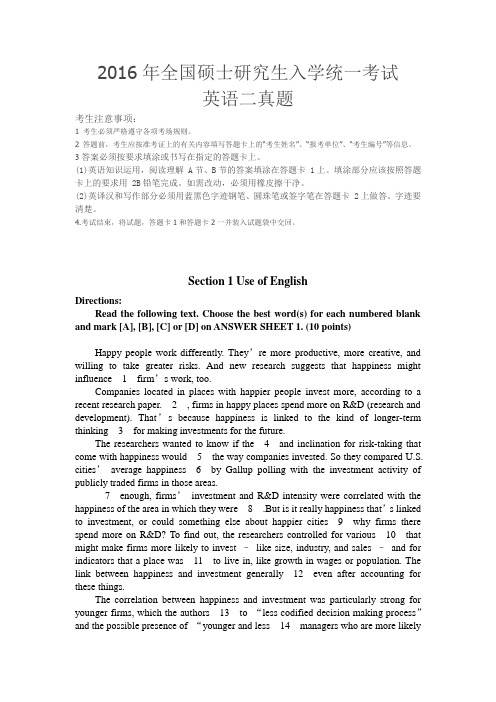
2016年全国硕士研究生入学统一考试英语二真题考生注意事项:1 考生必须严格遵守各项考场规则。
2 答题前,考生应按准考证上的有关内容填写答题卡上的“考生姓名”、“报考单位”、“考生编号”等信息。
3 答案必须按要求填涂或书写在指定的答题卡上。
(1)英语知识运用,阅读理解 A节、B节的答案填涂在答题卡 1上。
填涂部分应该按照答题卡上的要求用 2B铅笔完成。
如需改动,必须用橡皮擦干净。
(2)英译汉和写作部分必须用蓝黑色字迹钢笔、圆珠笔或签字笔在答题卡 2上做答。
字迹要清楚。
4.考试结束,将试题,答题卡1和答题卡2一并装入试题袋中交回。
Section 1 Use of EnglishDirections:Read the following text. Choose the best word(s) for each numbered blank and mark [A], [B], [C] or [D] on ANSWER SHEET 1. (10 points)Happy people work differently. They’re more productive, more creative, and willing to take greater risks. And new research suggests that happiness might influence__1__firm’s work, too.Companies located in places with happier people invest more, according to a recent research paper.__2__, firms in happy places spend more on R&D (research and development). That’s because happiness is linked to the kind of longer-term thinking__3__for making investments for the future.The researchers wanted to know if the__4__and inclination for risk-taking that come with happiness would__5__the way companies invested. So they compared U.S. cities’average happiness__6__by Gallup polling with the investment activity of publicly traded firms in those areas.__7__enough, firms’investment and R&D intensity were correlated with the happiness of the area in which they were__8__.But is it really happiness that’s linked to investment, or could something else about happier cities__9__why firms there spend more on R&D? To find out, the researchers controlled for various__10__that might make firms more likely to invest –like size, industry, and sales –and for indicators that a place was__11__to live in, like growth in wages or population. The link between happiness and investment generally__12__even after accounting for these things.The correlation between happiness and investment was particularly strong for younger firms, which the authors__13__to “less codified decision making process”and the possible presence of “younger and less__14__managers who are more likelyto be influenced by sentiment.”The relationship was__15__stronger in places where happiness was spread more__16__.Firms seem to invest more in places where most people are relatively happy, rather than in places with happiness inequality.__17__ this doesn’t prove that happiness causes firms to invest more or to take a longer-term view, the authors believe it at least__18__at that possibility. It’s not hard to imagine that local culture and sentiment would help__19__how executives think about the future. “It surely seems plausible that happy people would be more forward-thinking and creative and__20__R&D more than the average,”said one researcher.1. [A] why [B] where [C] how [D] when2. [A] In return [B] In particular [C] In contrast [D] In conclusion3. [A] sufficient [B] famous [C] perfect [D] necessary4. [A] individualism [B] modernism [C] optimism [D] realism5. [A] echo [B] miss [C] spoil [D] change6. [A] imagined [B] measured [C] invented [D] assumed7. [A] Sure [B] Odd [C] Unfortunate [D] Often8. [A] advertised [B] divided [C] overtaxed [D] headquartered9. [A] explain [B] overstate [C] summarize [D] emphasize10. [A] stages [B] factors [C] levels [D] methods11. [A] desirable [B] sociable [C] reputable [D] reliable12. [A] resumed [B] held [C]emerged [D] broke13. [A] attribute [B] assign [C] transfer [D]compare14. [A] serious [B] civilized [C] ambitious [D]experienced15. [A] thus [B] instead [C] also [D] never16. [A] rapidly [B] regularly [C] directly [D] equally17. [A] After [B] Until [C] While [D] Since18. [A] arrives [B] jumps [C] hints [D] strikes19. [A] shape [B] rediscover [C] simplify [D] share20. [A] pray for [B] lean towards [C] give away [D] send outSection ⅡReading ComprehensionPart ADirections:Read the following four texts. Answer the questions after each text by choosing A, B, C or D. Mark your answers on ANSWER SHEET 1. (40 points)Text 1It’s true that high-school coding classes aren’t essential for learning computer science in college. Students without experience can catch up after a few introductory courses, said Tom Cortina, the assistant dean at Carnegie Mellon’s School of Computer Science.However, Cortina said, early exposure is beneficial. When younger kids learn computer science, they learn that it’s not just a confusing, endless string of letters and numbers —but a tool to build apps, or create artwork, or test hypotheses. It’s not as hard for them to transform their thought processes as it is for older students. Breaking down problems into bite-sized chunks and using code to solve them becomes normal. Giving more children this training could increase the number of people interested in the field and help fill the jobs gap, Cortina said.Students also benefit from learning something about coding before they get to college, where introductory computer-science classes are packed to the brim, which can drive the less-experienced or-determined students away.The Flatiron School, where people pay to learn programming, started as one of the many coding bootcamps that’s become popular for adults looking for a career change. The high-schoolers get the same curriculum, but “we try to gear lessons toward things they’re interested in,”said Victoria Friedman, an instructor. For instance, one of the apps the students are developing suggests movies based on your mood.The students in the Flatiron class probably won’t drop out of high school and build the next Facebook. Programming languages have a quick turnover, so the “Ruby on Rails”language they learned may not even be relevant by the time they enter the job market. But the skills they learn —how to think logically through a problem andorganize the results —apply to any coding language, said Deborah Seehorn, an education consultant for the state of North Carolina.Indeed, the Flatiron students might not go into IT at all. But creating a future army of coders is not the sole purpose of the classes. These kids are going to be surrounded by computers —in their pockets, in their offices, in their homes —for the rest of their lives. The younger they learn how computers think, how to coax the machine into producing what they want —the earlier they learn that they have the power to do that —the better.21. Cortina holds that early exposure to computer science makes it easier to____.A. complete future job trainingB. remodel the way of thinkingC. formulate logical hypothesesD. perfect artwork production22. In delivering lessons for high-schoolers, Flatiron has considered their____.A. experienceB. academic backgroundsC. career prospectsD. interest23. Deborah Seehorn believes that the skills learned at Flatiron will____.A. help students learn other computer languagesB. have to be upgraded when new technologies comeC. need improving when students look for jobsD. enable students to make big quick money24. According to the last paragraph, Flatiron students are expected to____.A. compete with a future army of programmersB. stay longer in the information technology industryC. become better prepared for the digitalized worldD. bring forth innovative computer technologies25. The word “coax”(Line4, Para.6) is closest in meaning to____.A. challengeB. persuadeC. frightenD. misguideText 2Biologists estimate that as many as 2 million lesser prairie chickens---a kind of bird living on stretching grasslands—once lent red to the often gray landscape of the midwestern and southwestern United States. But just some 22,000 birds remain today, occupying about 16% of the species’historic range.The crash was a major reason the U.S Fish and Wildlife Service (USFWS)decided to formally list the bird as threatened. “The lesser prairie chicken is in a desperate situation,”said USFWS Director Daniel Ashe. Some environmentalists, however, were disappointed. They had pushed the agency to designate the bird as “endangered,” a status that gives federal officials greater regulatory power to crack down on threats. But Ashe and others argued that the“threatened”tag gave the federal government flexibility to try out new, potentially less confrontational conservations approaches. In particular, they called for forging closer collaborations with western state governments, which are often uneasy with federal action and with the private landowners who control an estimated 95% of the prairie chicken’s habitat.Under the plan, for example, the agency said it would not prosecute landowner or businesses that unintentionally kill, harm, or disturb the bird, as long as they had signed a range—wide management plan to restore prairie chicken habitat. Negotiated by USFWS and the states, the plan requires individuals and businesses that damage habitat as part of their operations to pay into a fund to replace every acre destroyed with 2 new acres of suitable habitat. The fund will also be used to compensate landowners who set aside habitat, USFWS also set an interim goal of restoring prairie chicken populations to an annual average of 67,000 birds over the next 10 years. And it gives the Western Association of Fish and Wildlife Agencies (WAFWA), a coalition of state agencies, the job of monitoring progress. Overall, the idea is to let “states”remain in the driver’s seat for managing the species,”Ashe said.Not everyone buys the win-win rhetoric Some Congress members are trying to block the plan, and at least a dozen industry groups, four states, and threeenvironmental groups are challenging it in federal court Not surprisingly, doesn’t go far enough “The federal government is giving responsibility for managing the bird to the same industries that are pushing it to extinction,”says biologist Jay Lininger.26. The major reason for listing the lesser prairie as threatened is____[A]its drastically decreased population[B]the underestimate of the grassland acreage[C]a desperate appeal from some biologists[D]the insistence of private landowners27.The “threatened”tag disappointed some environmentalists in that it_____[A]was a give-in to governmental pressure[B]would involve fewer agencies in action[C]granted less federal regulatory power[D]went against conservation policies28.It can be learned from Paragraph3 that unintentional harm-doers will not be prosecuted if they_____[A]agree to pay a sum for compensation[B]volunteer to set up an equally big habitat[C]offer to support the WAFWA monitoring job[D]promise to raise funds for USFWS operations29.According to Ashe,the leading role in managing the species in______[A]the federal government[B]the wildlife agencies[C]the landowners[D]the states30.Jay Lininger would most likely support_______[A]industry groups[B]the win-win rhetoric[C]environmental groups[D]the plan under challengeText 3That everyone’s too busy these days is a cliché. But one specific complaint is made especially mournfully:There’s never any time to read.What makes the problem thornier is that the usual time-management techniques don’t seem sufficient. The web’s full of articles offering tips on making time to read: “Give up TV”or “Carry a book with you at all times”But in my experience, using such methods to free up the odd 30 minutes doesn’t work. Sit down to read and the flywheel of work-related thoughts keeps spinning-or else you’re so exhausted that achallenging book’s the last thing you need. The modern mind, Tim Parks, a novelist and critic, writes, “is overwhelmingly inclined toward communication…It is not simply that one is interrupted; it is that one is actually inclined to interruption”. Deep reading requires not just time, but a special kind of time which can’t be obtained merely by becoming more efficient.In fact, “becoming more efficient”is part of the problem. Thinking of time as a resource to be maximised means you approach it instrumentally, judging any given moment as well spent only in so far as it advances progress toward some goal immersive reading, by contrast, depends on being willing to risk inefficiency, goallessness, even time-wasting. Try to slot it as a to-do list item and you’ll manage only goal-focused reading-useful, sometimes, but not the most fulfilling kind. “The future comes at us like empty bottles along an unstoppable and nearly infinite conveyor belt,”writes Gary Eberle in his book Sacred Time, and “we feel a pressure to fill these different-sized bottles (days, hours, minutes)as they pass, for if they get by without being filled, we will have wasted them”. No mind-set could be worse for losing yourself in a book.So what does work? Perhaps surprisingly, scheduling regular times for reading. You’d think this might fuel the efficiency mind-set, but in fact, Eberle notes, such ritualistic behaviour helps us “step outside time’s flow”into “soul time”. You could limit distractions by reading only physical books, or on single-purpose e-readers. “Carry a book with you at all times”can actually work, too-providing you dip in often enough, so that reading becomes the default state from which you temporarily surface to take care of business, before dropping back down. On a really good day, it no longer feels as if you’re “making time to read,”but just reading, and making time for everything else.31. The usual time-management techniques don’t work because[A] what they can offer does not ease the modern mind[B] what challenging books demand is repetitive reading[C] what people often forget is carrying a book with them[D] what deep reading requires cannot be guaranteed32. The “empty bottles”metaphor illustrates that people feel a pressure to[A] update their to-do lists[B] make passing time fulfilling[C] carry their plans through[D] pursue carefree reading33. Eberle would agree that scheduling regular times for reading helps[A] encourage the efficiency mind-set[B] develop online reading habits[C] promote ritualistic reading[D] achieve immersive reading34. “Carry a book with you at all times”can work if[A] reading becomes your primary business of the day[B] all the daily business has been promptly dealt with[C] you are able to drop back to business after reading[D] time can be evenly split for reading and business35. The best title for this text could be[A] How to Enjoy Easy Reading[B] How to Find Time to Read[C] How to Set Reading Goals[D] How to Read ExtensivelyText 4Against a backdrop of drastic changes in economy and population structure, younger Americans are drawing a new 21st-century road map to success, a latest poll has found.Across generational lines, Americans continue to prize many of the same traditional milestones of a successful life, including getting married, having children, owning a home, and retiring in their sixties. But while young and old mostly agree on what constitutes the finish line of a fulfilling life, they offer strikingly different paths for reaching it.Young people who are still getting started in life were more likely than older adults to prioritize personal fulfillment in their work, to believe they will advance their careers most by regularly changing jobs, to favor communities with more public services and a faster pace of life, to agree that couples should be financially secure before getting married or having children, and to maintain that children are best served by two parents working outside the home, the survey found.From career to community and family, these contrasts suggest that in the aftermath of the searing Great Recession, those just starting out in life are defining priorities and expectations that will increasingly spread through virtually all aspects of American life, from consumer preferences to housing patterns to politics.Young and old converge on one key point: Overwhelming majorities of both groups said they believe it is harder for young people today to get started in life than it was for earlier generations. While younger people are somewhat more optimistic than their elders about the prospects for those starting out today, big majorities in both groups believe those “just getting started in life”face a tougher a good-paying job, starting a family, managing debt, and finding affordable housing.Pete Schneider considers the climb tougher today. Schneider, a 27-yaear-old auto technician from the Chicago suburbs says he struggled to find a job after graduating from college. Even now that he is working steadily, he said.”I can’t afford to pay ma monthly mortgage payments on my own, so I have to rent rooms out to people to mark that happen.”Looking back, he is struck that his parents could provide a comfortable life for their children even though neither had completed college when he was young. “I still grew up in an upper middle-class home with parents who didn’thave college degrees,”Schneider said. “I don’t think people are capable of that anymore.”36. One cross-generation mark of a successful life is_____.[A] trying out different lifestyles[B] having a family with children[C] working beyond retirement age[D] setting up a profitable business37. It can be learned from Paragraph 3 that young people tend to ____.[A] favor a slower life pace[B] hold an occupation longer[C] attach importance to pre-marital finance[D] give priority to childcare outside the home38. The priorities and expectations defined by the young will ____.[A] become increasingly clear[B] focus on materialistic issues[C] depend largely on political preferences[D] reach almost all aspects of American life39. Both young and old agree that ____.[A] good-paying jobs are less available[B] the old made more life achievements[C] housing loans today are easy to obtain[D] getting established is harder for the young40. Which of the following is true about Schneider?[A] He found a dream job after graduating from college.[B] His parents believe working steadily is a must for success.[C] His parents’good life has little to do with a college degree.[D] He thinks his job as a technician quite challenging.2015年全国硕士研究生入学统一考试英语二真题考生注意事项:1 考生必须严格遵守各项考场规则。
英语完型阅读解题技巧

英语完型阅读解题技巧
英语完型阅读解题技巧如下:
1、重视主题句。
完型填空所给出的文章往往有明确的主线,同现和复现是词汇的衔接手段,可以联系上下文寻找相关线索,某一个空格所对应的答案很可能就是在上下文中复现或同现的相关词。
2、注意上下文寻找解题信息。
由于完型填空的文章是一个意义相关联的语篇,围绕一个话题论述,因此在行文中词语的重复、替代、复现和同现现象是不可避免的。
可以根据这些词之间的有机联系来确定答案。
3、运用背景知识和社会常识。
高考完型填空题的命题形式均为独立的语篇形式,并交织和渗透着各类相关的常识与文化背景知识。
考英语完形填空阅读理解及答案

考英语完形填空阅读理解及答案一、完形填空1.完形填空Can you imagine that we could build a beautiful city with rubbish? Maybe you will think it is1 . However, it can be true! Nothing is a waste if we have a creative mind. Let me show you something about2 rubbish.Sometimes we can see tons of rubbish in the streets, on the roads, near the buildings... hereand there. Many large cities became so ugly 3 it. Nobody likes rubbish, but in fact, some rubbish can be used again. All of us want to solve the problem, we must do something to 4 rubbish. We should take action from now on. 5 , some good things will not bewasted.Do you often throw away things you don't need any more? Have you ever thought about howthese things can actually be put to good use? For Example, when a car gets too old, it may notrun any more. But we can use the metal of the car to make something else. When a bottle is empty, it 6 as waste. You don't know bottle glass can be made into sand and used tobuild streets. Rubbish 7 food can be changed into fertilizer to make plants grow better. It is cheap and safe. And other rubbish can also be used to make building blocks. Now, 8 machines are designed for that.9 , people will watch films in a beautiful cinema which is built out of rubbish. Besides buildings and roads, cities may be made from rubbish. But so far, building beautiful cities madefrom rubbish is only 10 .1. A. important B. understanding C. unbelievable D. possible2. A. returning B. reusing C. reflecting D. repeating3. A. because B. because of C. instead of D. as for4. A. make a living as B. make promises to C. make up our mind to D. make use of5. A. On the way B. By the way C. In this way D. Out of the way6. A. will be thrown away B. will throw away C. threw away D. was thrown away7. A. from B. in C. on D. to8. A. fewer and fewer B. less and less C. more and more D. more and less9. A. Some day B. The other day C. Nowadays D. In the day10. A. a symbol B. a letter C. a lesson D. a dream【答案】(1)C;(2)B;(3)B;(4)D;(5)C;(6)A;(7)A;(8)C;(9)A;(10)D;【解析】【分析】本文介绍了用垃圾建筑城市的梦想。
Module 6【刷能力】(完形、阅读、短填、写作拔高练)(外研版)

2022-2023学年九年级英语上册单元模块满分必刷题(外研版)Module 6【刷能力】(完型、阅读、短填、写作拔高练) Part 1:完型+阅读+短填Part 2: 单元话题满分写作:针对问题提出建议一、完形填空(2022·辽宁盘锦·中考真题)根据短文内容,从各题的四个选项中选择一个最佳选项。
Dear students,You are leaving our class soon. You will set out on your new journey. It’s going to be strange and new to you for a while, and I hope it will be good to you.As your ____1____, I am proud of you, because you have grown up and you can make your own decisions. You see, up to now, I have been around to take care of you all the time and make you feel better. But now things are going to be different. You are going to ____2____ goodbye and start a new journey, and it will be ____3____ the unexpected. Living in the world will ____4____ love and courage, so I hope someone will take you by your hand and teach you the things you will have to know. At the same time, whenever you celebrate an achievement, ____5____ remember to be thankful to those who made it possible.Give yourselves quiet time to ____6____ the birds flying in the sky and the flowers smiling on the green hill.Remember the ____7____ are fantastic, and you can find your favorite articles there.Remember that it’s better to fail than it’s to give up, and the key is to learn from your failure(失败). But along with difficulties, there will also be ____8____ wonderful waiting for you.Remember to believe in yourselves, ____9____ someone tells that you are wrong. Treat yourselves gently(温柔地), but don’t ____10____ yourselves away from everything. Facing difficult situations will make you stronger.Just for today! Please believe that as you give to the world, the world will give to you.Yours,Mr. Green1.A.aunt B.classmate C.teacher D.mother2.A.say B.tell C.talk D.speak3.A.good for B.afraid of C.known for D.full of4.A.provide B.depend C.appear D.require 5.A.sometimes B.always C.never D.seldom6.A.watch B.prevent C.look D.count7.A.movies B.songs C.books D.shows8.A.anything B.something C.nothing D.everything9.A.since B.though C.until D.because10.A.help B.enjoy C.keep D.punish二、阅读单选(2022·四川绵阳·中考真题)Do you compare yourself to other people? Perhaps your best friend receives something you really want, or you’re not allowed to go to a concert but your brother or sister is. Even though comparisons are common and can sometimes be helpful, focusing(专注) on your own progress is important for your happiness.“We often compare ourselves to others who are doing better or not as well as ourselves.” says Dr. Jack. “But I suggest comparing yourself to your past self and your future self. This can make you feel proud of what you’ve achieved and excited about what you might do. Focusing on your own purposes is more worthwhile than always trying to come out on top.”Comparing yourself to those around you is natural and we often do it without realizing it. It can help us to be clear about our achievements and to form friendships with new people who have similar interests. However, it’s important to remember that nobody is perfect in real life. It’s also important to take note of how the comparison is making you feel. “If you begin to feel quite low, focus on your own strengths.” says Jack. In other words, you can ask yourself questions like “What can I do well in?”, which can help you trust yourself.Maybe here you are wondering “What if all my friends are better than me?”. Dr. White says that jealousy(妒忌) is not bad but focusing on bettering your own work can help you feel just as successful. He also mentions that learning to celebrate your friends’ success can not only help to cheer your friends up but also help you feel good. It will encourage you to build each other up.11.What does the writer tell us in Paragraph 1?A.We should compare with others.B.We should share things with brothers.C.We should enjoy concerts with sisters.D.We should focus on our own progress.12.Why should you compare yourself to your past self?A.To care about others.B.To change your purposes.C.To increase your excitement.D.To be proud of your achievements.13.What does the underlined phrase “your own strengths” probably mean in Paragraph 3?A.what you’re good at B.what you’ve understoodC.what you’re crazy about D.what you’ve experienced14.What does Dr. White suggest?A.Trusting your friends.B.Cheering on tiny success.C.Celebrating others’ success.D.Forming a deep friendship.15.What would be the best title for the passage?A.Plan Your Own Future B.Enjoy Your Own HappinessC.Run Your Own Race D.Follow Your Own Dream(2022·山东济南·中考真题)Have you ever met large changes in life and work? How would you feel in most cases? In fact, we all have to go through the grief cycle(悲伤周期), which has the following periods: The first period: “It can’t be happening.”Anger: “Why me? It’s not fair.”Depression: “I’m so sad. Why do I have to do all of these?”Acceptance: “It’s going to be OK.”I’m honestly not sure how scientific this model is, but I certainly believe that you will work better after going through these major changes.Find out what your anger does for you—good or bad?What does being angry do for you? Think back to the situation where you have been angry at work and ask yourself how it influences you, including: your relationship with co-workers, the quality(质量) of your work and health, how you feel outside of work, your relationship with friends and family.Find out what makes you angrier and less angry.What makes you angrier? Which thoughts, situations, people or conversations set you off? And what makes you less angry? I’m sure you are not angry all the time. What makes you calm and stops you fromfeeling angry? Find out. Then start doing less of what makes you angry and more of the things that cool you down.Focus on gratitude.What are you grateful for? As I mentioned above, anger is part of the grief cycle which is connected with what you lose. Gratitude is the opposite of loss because it comes from the good things you have in your life. It’s simple. Every evening, sit down with a piece of paper and make two gratitude lists: three things I was grateful for at work today; three things I was thankful for in life today.Change your focus from “What was done to me” to “What I can do”.I know this is the basic piece of all self-help advice. Life is 10% about what happens to you and 90% about how you deal with it, or you must take responsibility for your own situation, rather than be a victim(牺牲品) of it. That kind of advice can get pretty boring. But that doesn’t make it less true.16.Why does the writer begin the text by asking questions?A.To explain facts.B.To express disagreement.C.To give opinions.D.To catch the readers’ interest.17.What’s the writer’s suggestion about dealing with anger?A.Love friends and family.B.Do things that make you peaceful.C.Be friendly to co-workers.D.Write down what makes you angry.18.What does the underlined word “gratitude” most probably mean?A.Thanks.B.Safety.C.Courage.D.Praise.19.Which of the following best describes the last piece of advice?A.Creative.B.Special.C.Valuable.D.Doubtful.20.What is the text mainly about?A.What the grief cycle is about.B.How to deal with the grief cycle.C.What causes the grief cycle.D.How the grief cycle influences people.三、短文语境提示填空(2022·山西·模拟预测)请阅读下面短文,根据文章内容,在空白处填入一个..恰当的单词,使短文通顺、连贯。
初中英语完型阅读解题技巧
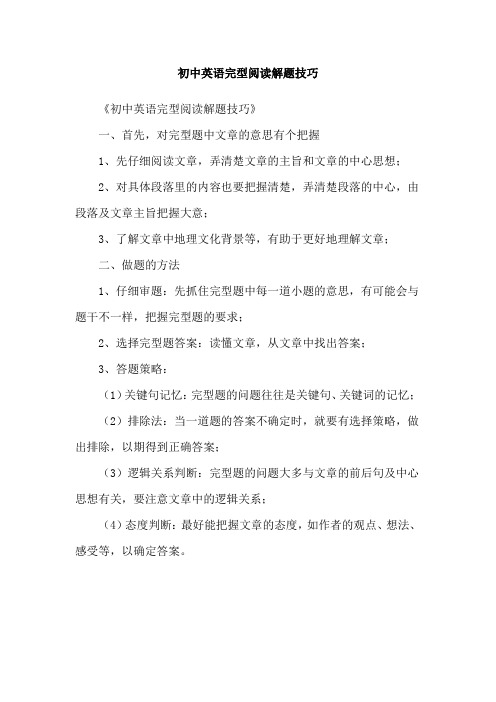
初中英语完型阅读解题技巧
《初中英语完型阅读解题技巧》
一、首先,对完型题中文章的意思有个把握
1、先仔细阅读文章,弄清楚文章的主旨和文章的中心思想;
2、对具体段落里的内容也要把握清楚,弄清楚段落的中心,由段落及文章主旨把握大意;
3、了解文章中地理文化背景等,有助于更好地理解文章;
二、做题的方法
1、仔细审题:先抓住完型题中每一道小题的意思,有可能会与题干不一样,把握完型题的要求;
2、选择完型题答案:读懂文章,从文章中找出答案;
3、答题策略:
(1)关键句记忆:完型题的问题往往是关键句、关键词的记忆;
(2)排除法:当一道题的答案不确定时,就要有选择策略,做出排除,以期得到正确答案;
(3)逻辑关系判断:完型题的问题大多与文章的前后句及中心思想有关,要注意文章中的逻辑关系;
(4)态度判断:最好能把握文章的态度,如作者的观点、想法、感受等,以确定答案。
高一英语完型阅读理解训练及答案
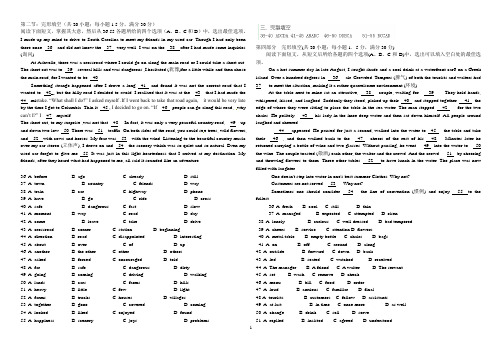
第二节:完形填空(共20小题;每小题1.5分,满分30分)阅读下面短文,掌握其大意,然后从36-55各题所给的四个选项(A、B、C和D)中,选出最佳选项。
I made up my mind to drive to South Carolina to meet my friends in my used car. Though I had only beenthere once 36 and did not know the 37 very well. I was on the 38 after I had made some inquiries (询问).At Ashvelle, there was a crossroad where I could go on along the main road or I could take a short cut. The short cut was to 39 several hills and was dangerous ,I hesitated (犹豫)for a little while and then chose the main road, for I wanted to be 40 .Something strange happened after I drove a long 41 and found it was not the correct road th at I wanted to 42_, but the hilly road I decided to avoid .I realized that it was at the 43 that I had made the 44 mi stake. “What shall I do?” I asked myself .If I went back to take that road again, it would be very late by the time I got to Columbia. Thin it 45 , I decided to go on. “If 46 people can go along this road, why can’t I?” I 47 myselfThe short cut, to my surprise ,was not that 48 .In fact, it was only a very peaceful country road, 49 up and down two low 50 .There was 51 traffic. On both sides of the road, you could se e trees, wild flowers, and 52 with cows and horses. My fear was 53 with the wind. Listening to the beautiful country music over my car stereo (立体声), I drove on and 54 the scenery which was so quiet and so natural .Even my used car forgot to give me 55 .It was just in this light heartedness that I arrived at my destination. My friends, after they heard what had happened to me, all said it sounded like an adventure.36. A. before B. ago C. already D. still37. A. town B. country C. friends D. way38. A. train B. car C. highway D .phone39. A. have B. go C. ride D. cross40. A. safe B. dangerous C. fast D. slow41. A. moment B. way C. road D. day42. A. come B. leave C. take D. drive43. A. crossroad B. corner C. station D. beginning44. A. direction B. road C. disappointed D. interesting45. A. about B. over C. of D. up46. A. another B. the other C. other D. others47. A. asked B. forced C. encouraged D. told48. A. far B. safe C. dangerous D. dirty49. A. going B. coming C. driving D. walking50. A. lands B. cars C. farms D. hills51. A. heavy B. little C. few D. light52. A. farms B. trucks C. houses D. villages53. A. together B. gone C. covered D. coming54. A. looked B. liked C. enjoyed D. found55. A. happiness B. scenery C. joys D. problems 第四部分完形填空(共20小题;每小题1.5分,满分30分)阅读下面短文,从短文后所给各题的四个选项(A、B、C和D)中,选出可以填入空白处的最佳选项。
考研英语一阅读完型
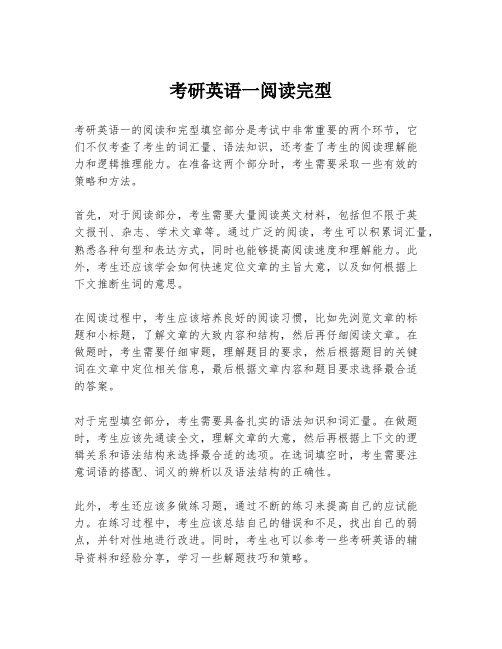
考研英语一阅读完型考研英语一的阅读和完型填空部分是考试中非常重要的两个环节,它们不仅考查了考生的词汇量、语法知识,还考查了考生的阅读理解能力和逻辑推理能力。
在准备这两个部分时,考生需要采取一些有效的策略和方法。
首先,对于阅读部分,考生需要大量阅读英文材料,包括但不限于英文报刊、杂志、学术文章等。
通过广泛的阅读,考生可以积累词汇量,熟悉各种句型和表达方式,同时也能够提高阅读速度和理解能力。
此外,考生还应该学会如何快速定位文章的主旨大意,以及如何根据上下文推断生词的意思。
在阅读过程中,考生应该培养良好的阅读习惯,比如先浏览文章的标题和小标题,了解文章的大致内容和结构,然后再仔细阅读文章。
在做题时,考生需要仔细审题,理解题目的要求,然后根据题目的关键词在文章中定位相关信息,最后根据文章内容和题目要求选择最合适的答案。
对于完型填空部分,考生需要具备扎实的语法知识和词汇量。
在做题时,考生应该先通读全文,理解文章的大意,然后再根据上下文的逻辑关系和语法结构来选择最合适的选项。
在选词填空时,考生需要注意词语的搭配、词义的辨析以及语法结构的正确性。
此外,考生还应该多做练习题,通过不断的练习来提高自己的应试能力。
在练习过程中,考生应该总结自己的错误和不足,找出自己的弱点,并针对性地进行改进。
同时,考生也可以参考一些考研英语的辅导资料和经验分享,学习一些解题技巧和策略。
总之,考研英语一的阅读和完型填空部分需要考生具备较高的英语水平和应试技巧。
通过系统的学习和大量的练习,考生可以逐步提高自己的英语能力,从而在考试中取得好成绩。
完型填空阅读理解做题技巧总结
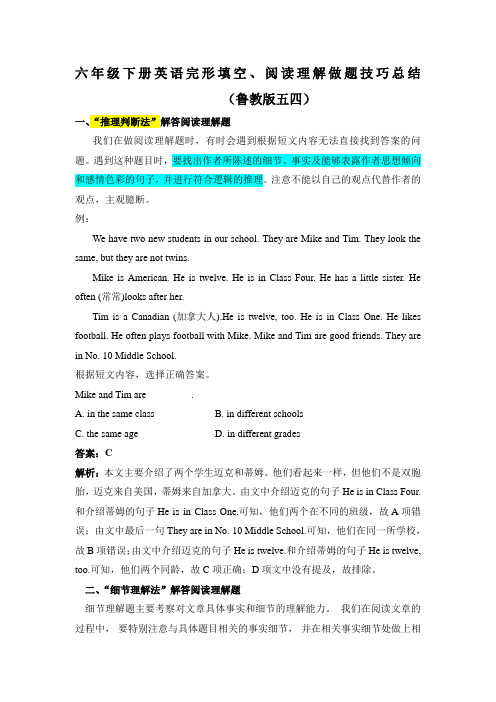
六年级下册英语完形填空、阅读理解做题技巧总结(鲁教版五四)一、“推理判断法”解答阅读理解题我们在做阅读理解题时,有时会遇到根据短文内容无法直接找到答案的问题。
遇到这种题目时,要找出作者所陈述的细节、事实及能够表露作者思想倾向和感情色彩的句子,并进行符合逻辑的推理。
注意不能以自己的观点代替作者的观点,主观臆断。
例:We have two new students in our school. They are Mike and Tim. They look the same, but they are not twins.Mike is American. He is twelve. He is in Class Four. He has a little sister. He often (常常)looks after her.Tim is a Canadian (加拿大人).He is twelve, too. He is in Class One. He likes football. He often plays football with Mike. Mike and Tim are good friends. They are in No. 10 Middle School.根据短文内容,选择正确答案。
Mike and Tim are .A. in the same classB. in different schoolsC. the same ageD. in different grades答案:C解析:本文主要介绍了两个学生迈克和蒂姆。
他们看起来一样,但他们不是双胞胎,迈克来自美国,蒂姆来自加拿大。
由文中介绍迈克的句子He is in Class Four.和介绍蒂姆的句子He is in Class One.可知,他们两个在不同的班级,故A项错误;由文中最后一句They are in No. 10 Middle School.可知,他们在同一所学校,故B项错误;由文中介绍迈克的句子He is twelve.和介绍蒂姆的句子He is twelve, too.可知,他们两个同龄,故C项正确;D项文中没有提及,故排除。
九年级英语完型与阅读练习题
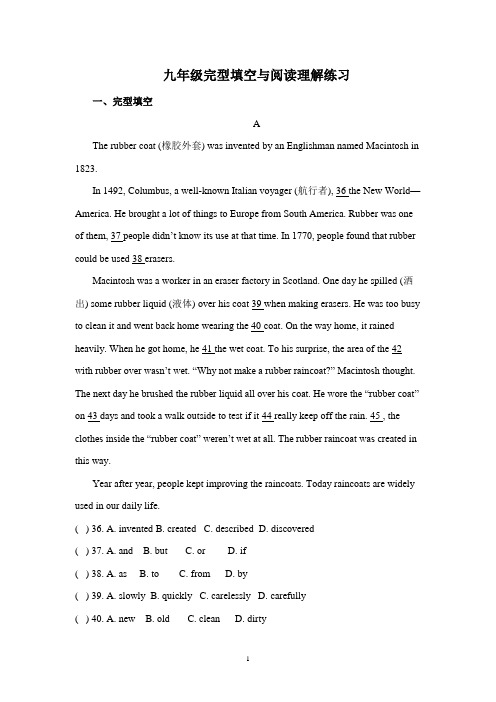
九年级完型填空与阅读理解练习一、完型填空AThe rubber coat (橡胶外套) was invented by an Englishman named Macintosh in 1823.In 1492, Columbus, a well-known Italian voyager (航行者), 36 the New World—America. He brought a lot of things to Europe from South America. Rubber was one of them, 37 people didn’t know its use at that time. In 1770, people found that rubber could be used 38 erasers.Macintosh was a worker in an eraser factory in Scotland. One day he spilled (洒出) some rubber liquid (液体) over his coat 39 when making erasers. He was too busy to clean it and went back home wearing the 40 coat. On the way home, it rained heavily. When he got home, he 41 the wet coat. To his surprise, the area of the 42 with rubber over wasn’t wet. “Why not make a rubber raincoat?” Macintosh though t. The next day he brushed the rubber liquid all over his coat. He wore the “rubber coat” on 43 days and took a walk outside to test if it 44 really keep off the rain. 45 , the clothes inside the “rubber coat” weren’t wet at all. The rubber raincoat was cr eated in this way.Year after year, people kept improving the raincoats. Today raincoats are widely used in our daily life.( ) 36. A. invented B. created C. described D. discovered( ) 37. A. and B. but C. or D. if( ) 38. A. as B. to C. from D. by( ) 39. A. slowly B. quickly C. carelessly D. carefully( ) 40. A. new B. old C. clean D. dirty( ) 41. A. took off B. put on C. took out D. put off( ) 42. A. body B. coat C. house D. liquid( ) 43. A. cloudy B. windy C. snowy D. rainy( ) 44. A. might B. should C. could D. must( ) 45. A. Especially B. Suddenly C. Surprisingly D. NormallyBThe Double Seventh Festival, also known as the Qixi Festival, is a traditional Chinese festival. Here is a beautiful story 36 it.Long, long ago, there was a young man named Niulang. One day, he 37 a beautiful girl —Zhinü, the Goddess’s seventh daughter. She had just run away from the boring heaven (天国) to look for fun on Earth. Zhinü soon 38 Niulang, and they got married without telling the Goddess. They lived a happy life on Earth and gave birth to two children. Unluckily, the Goddess soon found out the fact and 39 Zhinü to return to heaven. With the help of his magic cow, Niulang flew to heaven with his children to look for his wife. The Goddess discovered this and was very 40 . Taking out her hairpin (发簪), the Goddess created a wide river in the sky to separate (分开) the two 41 . From then on, Niulang and Zhinü had to live 42 on the two sides of the river. However, their true love touched all the magpies (喜鹊) in the world, 43 once a year tens of thousands of magpies would fly up to heaven to make a bridge (“the bridge of magpies”) for the couple to meet each other. At last, the Goddess allowed 44 to meet each year on the 7th day of the 7th lunar month. That’s 45 the Double Seventh Festival started. Today, it is a great day for Chinese young people to express their love.( )36. A. through B. behind C. with D. after( )37. A. met B. told C. thanked D. missed( )38. A. looked forward to B. parted with C. turned down D. fell in love with( )39. A. promised B. waited C. ordered D. helped( )40. A. angry B. sorry C. interested D. satisfied( )41. A. friends B. lovers C. parents D. children( )42. A. back B. away C. halfway D. apart( )43. A. so B. but C. though D. because( )44. A. him B. her C. us D. them( )45. A. when B. how C. what D. whereCIt was a very foggy (雾茫茫的) morning in London. The fog was so thick that it was 36 to see more than a foot or so. Buses, cars and taxis were stopped along the roadside, unable to move because the drivers couldn’t 37 . People were trying to walk to their destinations (目的地), but most were losing their 38 in the fog.Mr. Smith had a very important meeting at the House of Commons, but he was not familiar (熟悉的) with the area and 39 could take him there in such heavy fog. So he was a little worried. He was trying to find his way in the fog. Soon, however, he realized that he was lost. 40 he bumped (撞) into a stranger. Mr. Smith said sorry to the stranger and then asked him whether he 41 help him find his way. The stranger said it was a piece of cake and offered to take Mr. Smith to the meeting place. Mr. Smith thanked 42 and they started to walk. The fog was getting thicker and thicker every minute 43 the stranger had no difficulty in finding the way. They went along one street, turned down another, crossed a square and at last, after about half an hour, they 44 the meeting place.Mr. Smith couldn’t understand how the stranger found his way. “It is wonderful,” he said. “But 45 do you find the way in the thick fog?”“It is no trouble at all to me,” said the stranger. “I am blind.”( )36. A. simple B. useless C. necessary D. impossible( )37. A. see B. touch C. guess D. follow( )38. A. way B. interests C. lives D. money( )39. A. somebody B. anybody C. nobody D. everybody( )40. A. Usually B. Suddenly C. Probably D. Especially( )41. A. need B. must C. could D. should( )42. A. it B. them C. her D. him( )43. A. if B. but C. unless D. and( )44. A. gave up B. wrote down C. arrived at D. looked for( )45. A. how B. why C. where D. when二、阅读理解:AFifth-grader Kayla Martel loves basketball. But her school doesn’t have a girls’ team. So for the past four years, Kayla has played on the boys’ team at St. John the Apostle School in Clark, New Jersey. That hadn’t been a problem until earlier th is year. The team was told that it either had to ask Kayla and another girl to leave the team or end its season early.The team, called the Chargers, plays in a league (联赛) that didn’t allow mixed teams after fourth grade. When the league leader found out that there were girls in the team, he gave the coaches (教练) bad news. The team could keep playing but only without the girls.Keisha Martel, Kayla’s mom, is one of the Chargers’ coaches. She asked the team to take a vote (投票), knowing it would be difficult for the kids to choose.“They all said, ‘It doesn’t matter. We’re a team and we’re sticking together (团结一致),’” said Keisha.The Chargers wasn’t allowed to play for a few weeks, but then the league reversed its decision. The team, girls included, played the rest of the season. They even made it to the championship (锦标赛) game — and won!Kayla has some advice for other teams. “Make sure you are family — you have each other’s back,” she says.根据材料内容选择最佳答案。
高中英语完型阅读教辅
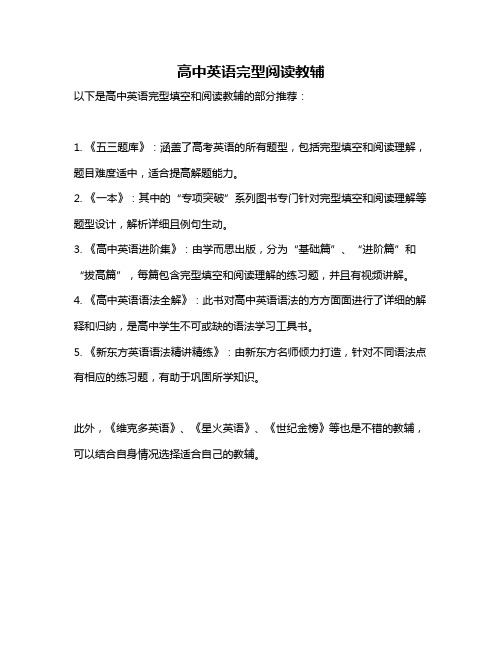
高中英语完型阅读教辅
以下是高中英语完型填空和阅读教辅的部分推荐:
1. 《五三题库》:涵盖了高考英语的所有题型,包括完型填空和阅读理解,题目难度适中,适合提高解题能力。
2. 《一本》:其中的“专项突破”系列图书专门针对完型填空和阅读理解等题型设计,解析详细且例句生动。
3. 《高中英语进阶集》:由学而思出版,分为“基础篇”、“进阶篇”和“拔高篇”,每篇包含完型填空和阅读理解的练习题,并且有视频讲解。
4. 《高中英语语法全解》:此书对高中英语语法的方方面面进行了详细的解释和归纳,是高中学生不可或缺的语法学习工具书。
5. 《新东方英语语法精讲精练》:由新东方名师倾力打造,针对不同语法点有相应的练习题,有助于巩固所学知识。
此外,《维克多英语》、《星火英语》、《世纪金榜》等也是不错的教辅,可以结合自身情况选择适合自己的教辅。
七年级下学期英语期末完型与阅读真题训练
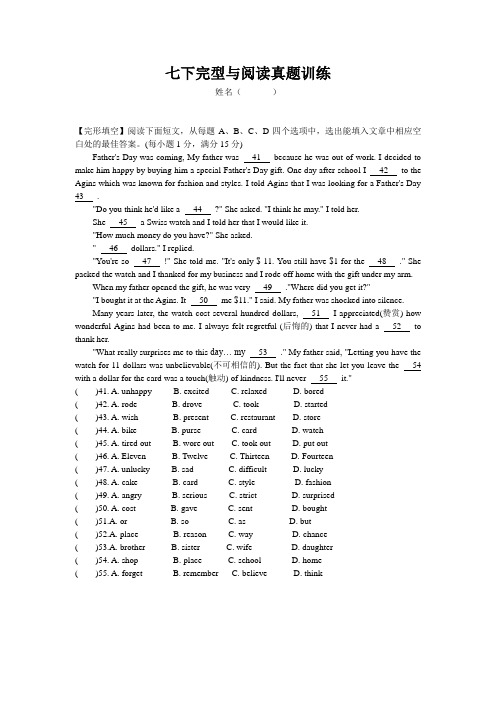
七下完型与阅读真题训练姓名()【完形填空】阅读下面短文,从每题A、B、C、D四个选项中,选出能填入文章中相应空白处的最佳答案。
(每小题1分,满分15分)Father's Day was coming, My father was 41 because he was out of work. I decided to make him happy by buying him a special Father's Day gift. One day after school I 42 to the Agins which was known for fashion and styles. I told Agins that I was looking for a Father's Day 43 ."Do you think he'd like a 44 ?" She asked. "I think he may." I told her.She 45 a Swiss watch and I told her that I would like it."How much money do you have?" She asked." 46 dollars." I replied."You're so 47 !" She told me. "It's only $ 11. You still have $1 for the 48 ." She packed the watch and I thanked for my business and I rode off home with the gift under my arm.When my father opened the gift, he was very 49 ."Where did you get it?""I bought it at the Agins. It 50 me $11." I said. My father was shocked into silence.Many years later, the watch cost several hundred dollars, 51 I appreciated(赞赏) how wonderful Agins had been to me. I always felt regretful (后悔的) that I never had a 52 to thank her."What really surprises me to this day… my 53 ." My father said, "Letting you have the watch for 11 dollars was unbelievable(不可相信的). But the fact that she let you leave the 54 with a dollar for the card was a touch(触动) of kindness. I'll never 55 it."( )41. A. unhappy B. excited C. relaxed D. bored( )42. A. rode B. drove C. took D. started( )43. A. wish B. present C. restaurant D. store( )44. A. bike B. purse C. card D. watch( )45. A. tired out B. wore out C. took out D. put out( )46. A. Eleven B. Twelve C. Thirteen D. Fourteen( )47. A. unlucky B. sad C. difficult D. lucky( )48. A. cake B. card C. style D. fashion( )49. A. angry B. serious C. strict D. surprised( )50. A. cost B. gave C. sent D. bought( )51.A. or B. so C. as D. but( )52.A. place B. reason C. way D. chance( )53.A. brother B. sister C. wife D. daughter( )54. A. shop B. place C. school D. home( )55. A. forget B. remember C. believe D. think【阅读理解】.阅读下列短文,从A、B、C、D四个选项中,选出一个最佳答案。
英语完形填空与阅读理解提分技巧

英语完形填空与阅读理解提分技巧1解题步骤【第一步】要快速通读全文,了解文章大意,正确分析、归纳文章主旨。
【第二步】在理解文章大意基础上,对每道题所给的词语进行剖析,考虑语境,上下呼应,运用逻辑思维进行推理,再根据自己最有把握的、最熟悉的短语、习惯用语、动词形式和句子结构等,先完成简单的,把难的留在后面。
【第三步】再细读全文,集中精力解决难点,填补空缺。
【第四步】答题完毕,遵循由整体到局部、由局部到整体的规律,再耐心通读全文,认真复查所选答案是否得当,语法是否正确,逻辑推理是否合理。
2解题技巧【技巧1】前后照应利用上下文信息,选择或填写正确的词是完型填空解题时最常用的方法之一。
在做四选一的完型填空时,我们有时会发现每一个选项从语法角度来讲都可以说得通,遇到这种情况,我们应细读上下文,正确答案会在上下文中得到提示。
试看以下例题:【例1】What do I remember about my childhood? There were good things and badthings. We used to live______ , and my parents always got up early in the morning to feed the cows and sheep.A. in a townB. on a farmC. on a busy streetD. in a city【解析】B 本段主要讲作者回忆儿童时代所居住的地点。
从四个选项来看都是可能的,语法上都说得通。
但通过下文my parents always got up early in the morning to feed the cows and sheep.提示我们可以知道作者生活在农村,正确答案选B。
【例2】I always remember waking up to the smell of the breakfast my mother was cooking. What a wonderful smell! I used to _______ ,wash quickly and run downstairs. My breakfast would be waiting for me on the table.A. leave the bedB.lie in bedC. jump out of bedD. get up【解析】C 本段讲每天早上妈妈煮的早餐发出诱人的香味,使得躺在床上的我立即起床。
完型,阅读,短文填空,信息归纳 (四)含答案
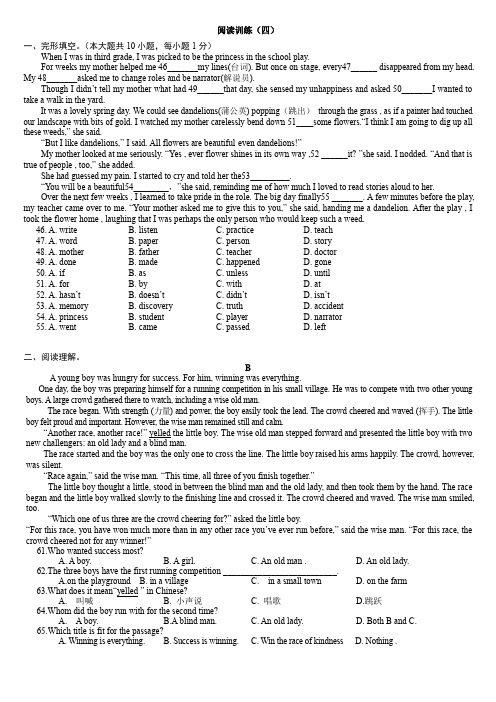
阅读训练(四)一、完形填空。
(本大题共10小题,每小题1分)When I was in third grade, I was picked to be the princess in the school play.For weeks my mother helped me 46_______my lines(台词). But once on stage, every47______ disappeared from my head. My 48_______asked me to change roles and be narrator(解说员).Though I didn’t tell my mother what had 49______that day, she sensed my unhappiness and asked 50_______I wanted to take a walk in the yard.It was a lovely spring day. We could see dandelions(蒲公英) popping(跳出)through the grass , as if a painter had touched our landscape with bits of gold. I watched my mother carelessly bend down 51____some flowers.“I think I am going to dig up al l these weeds,” she said.“But I like dandelions,” I said. All flowers are beautiful-even dandelions!”My mother looked at me seriously. “Yes , ever flower shines in its own way ,52 ______it? ”she said. I nodded. “And that is true of people , too,” she added.She had guessed my pain. I started to cry and told her the53_________.“You will be a beautiful54________,”she said, reminding me of how much I loved to read stories aloud to her.Over the next few weeks , I learned to take pride in the role. The big day finally55 _______. A few minutes before the play, my teacher came over to me. “Your mother asked me to give this to you,” she said, handing me a dandelion. After the play , I took the flower home , laughing that I was perhaps the only person who would keep such a weed.46. A. write B. listen C. practice D. teach47. A. word B. paper C. person D. story48. A. mother B.father C. teacher D. doctor49. A. done B. made C. happened D. gone50. A. if B. as C. unless D. until51. A. for B. by C. with D. at52. A. hasn’t B. doesn’t C. didn’t D. isn’t53. A. memory B. discovery C. truth D. accident54. A. princess B. student C. player D. narrator55. A. went B. came C. passed D. left二、阅读理解。
- 1、下载文档前请自行甄别文档内容的完整性,平台不提供额外的编辑、内容补充、找答案等附加服务。
- 2、"仅部分预览"的文档,不可在线预览部分如存在完整性等问题,可反馈申请退款(可完整预览的文档不适用该条件!)。
- 3、如文档侵犯您的权益,请联系客服反馈,我们会尽快为您处理(人工客服工作时间:9:00-18:30)。
阅读短文, 根据其内容回答问题。
For many of us the home in our hearts is one we remember from childhood. For me it was the real house I ever lived in. The house had a big front yard with a swing(秋千) on it. Mary is my sister. We were both 8 years old at the time, but we weren’t twins. I in was January, and she in December. When it rained, we’d play there with neighborhood kids, tell each other movies we’d been to, and sing rounds like “Row, Row, Row your Boat.” I remember laughing a lot at funny stories. Inside, of course, was the kitchen. I remember Mom putting newspapers on the kitchen table. In that room, I also remember the more pleasing aroma(芳香) of dinner being cooked. They say smell is the strongest sense memory. I can still smell the soup. Whatever the dinner was, the family would always eat it every night in the dining room when Dad was home. After dinner, Mary and I would help with the dishes: I’d wash, and she’d dry. There was a lot of singin g going on, too. In the living room there was the piano. Mom often played “That Old Silver Moon” on it. Both Mary and I were taking piano lessons so there was much practicing. When the piano wasn’t playing, the radio was.The expression “Home Sweet Home,” to me, is the memory of voices and faces in that place on Thanksgiving and Christmas, of other family members—grandparents, aunts, uncles, cousins, and the little dog named Inky. It’s not the rooms of that house I think of so much as what went on there. It’s always the people, the singing, laughing, and joking—and occasionally quarreling and crying. Quite often, come to think of it. You go back and look at a house all these years later, and it seems so different now, much smaller than you remember. And you realize that if it’s still there at all, it has to be basically what it was. It’s not the brick, the shape, or size that matters.It’s us who have changed.65. Are Mary and the writer twins?66. Does the writer have a small family or a big family?67. What did the writer usually do after dinner?68. Why does the house look smaller to the writer now?69. What’s in the writer’s memory?DChristmas is a time for shopping. But I think those of us who live in large cities in Asia would be cheating ourselves if we said this is the only time we are busy shopping. No, from Bangkok to Singapore, from Shanghai to Manila, shopping—especially shopping in large centers—is a year-round activity.Shopping centers are good. They show Asia’s surprising economic growth, and how far we have come in such a short time. For many of the older generation who can remember a time when everyone lived in villages and there was no running water, the air-conditioned centre means comfort, choice, luxury (豪华) and better times.Nowadays, it seems our usual activities happen in the centre—it’s where we shop, eat, watch movies, meet our friends or just generally walk around.Furthermore, we have come to regard shopping centers as important landmarks or tourist attractions. Whole generations of Asians are growing up to think that, besides home and school, the shopping center is the most natural place to be.My idea about shopping centers is not that they are often big buildings that look quite different from other parts in a city, or that they promote (促进) shopping at a time when our planet can hardly afford it. My main idea about centers is that they don’t really seem to make us happy. The large advertisements outside the stores could make us think that if we only had this pair of jeans, or if we hung out at this café drinking coffee, then we could feel more successful. But once we buy something, weonly want to buy something more—as everyone already knows.Shopping centers, even though they try to look as welcoming as possible, can be unkind places. To make us buy, they must make us feel that we are short of something, or that everyone else has something we do not yet own. We must want to surpass others or at the very least to keep up. How can this thought always trying to be cool bring us true joy?The saddest thing is that the modern centre has stopped us from many beautiful, necessary and important activities. We have no one to blame but ourselves. Instead of shopping, we could be cooking, visiting a nearby waterfall, going to the beach, reading a novel, taking a long walk, playing a sport, learning a dance or visiting each other’s homes.Every time we have a spare piece of land, all we can think of building on it is yet another centre. Perhaps instead, we should be building libraries, theatres, museums, sports halls, public swimming pools, parks—the list is endless. We might even consider leaving that land alone. This is something that the centre may have caused us to forget—in order to be happy, we must create as well as consume (消费).57. What is the writer’s attitude towards shopping centers?A. He likes them very much.B. He doesn’t like them at all.C. He likes them only a little.D. He doesn’t like all of them.58. Why do more and more shopping centers appear in some Asian countries?A. Because economy in the world develops very fast.B. Because shopping centers have attracted tourists all over the world.C. Because people go shopping in large shopping centers all year round.D. Because shopping centers have become an important part in everyone’s life.59. What is the greatest disadvantage of shopping centers, according to the writer?A. They don’t seem to make us happy.B. They lead us to buy more and more things.C. They force us to give up many other activities.D. They have us fall into endless competition with others.60. Which of the following is not true?A. It is very easy for us to find a shopping centre in a big city.B. There are usually all kinds of services in a shopping center.C. The government must be responsible for the writer’s sadness.D. Besides shopping, there’re many other activities we can enjoy六、完形填空BDABC AADCB DB七、阅读理解A篇ABDAB篇DAC篇ADBC。
